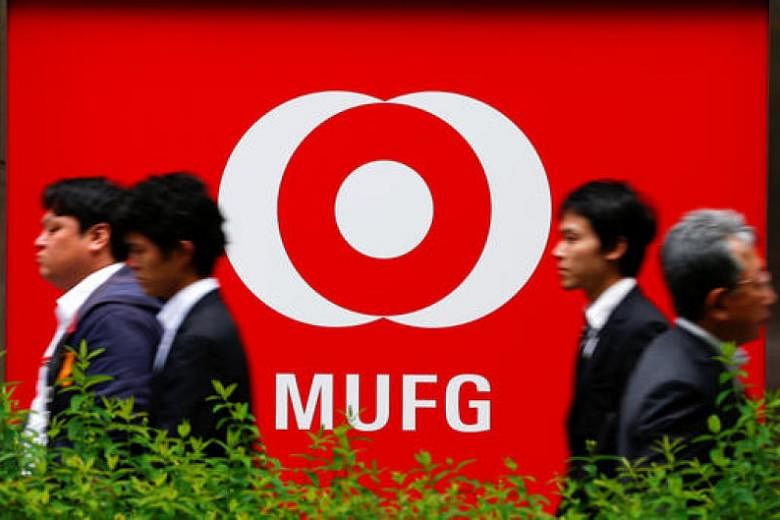TOKYO (BLOOMBERG) - Japan's biggest bank is set to undergo the most dramatic reduction in headcount since it was formed after the nation's banking crisis shook the industry almost 20 years ago.
Mitsubishi UFJ Financial Group is considering eliminating about 10,000 positions - about 7 per cent of its workforce - over a decade as low interest rates and intensifying competition squeeze profit, people with knowledge of the matter said. That's more than double the 3,500 full-time roles that President Nobuyuki Hirano said last year MUFG would cut from its main banking unit through natural attrition and less hiring.
The move is a striking example of how Japanese banks are struggling with an increasingly challenging business environment as the central bank's negative-rate policy erodes margins and a shrinking population curtails credit demand. MUFG is seeking to reshape itself by closing branches and boosting technology investment - a strategy that peers at home and abroad are also pursuing as digital advancements transform the financial industry and provide an opportunity to save costs.
"I think this is a big deal," said Michael Makdad, a bank analyst in Tokyo at Haitong International Securities Group Ltd. "For banks, fundamentally, their business model needs to change - a lot - and this is a symbol of that."
Shares of MUFG rose 1.1 per cent to 722.6 yen at the close of trading in Tokyo on Friday (June 16). The stock is up less than 1 per cent this year, trailing the benchmark Topix Index's 5.1 per cent gain.
The drop in headcount could take place over a shorter time frame than the 10 years estimated, according to the people, who asked not to be identified because the plans are private. Most of the positions being reduced are within Japan, where strict labour laws make it difficult to fire staff.
MUFG, established in 2005 from a merger, employs about 147,000 people worldwide.
When asked about the plan, MUFG spokesman Taiki Kitaura declined to comment beyond saying the bank is considering various options such as reducing work volumes by making use of digital technology.
MUFG announced a "re-imagining" strategy in May, saying it would cut 120 billion yen (S$1.5 billion) of costs over several years through initiatives such as using financial technology to add digital banking channels and streamline back-office functions. Excess staff will be transferred to sales and marketing positions.
"As structural problems such as the decline in lending margins and the shrinking and ageing population emerge, we need to bring in new technologies as seen with fintech," Hirano told reporters on Thursday in his capacity as chairman of the Japanese Bankers Association. "We must reform our business model to advance beyond the traditional deposit and loan business with the ability to provide solutions."
Under the strategy, the bank is also seeking to boost gross profit by 180 billion yen through measures such as shifting thousands of corporate accounts to its banking unit from its trust banking arm in an effort to unify loan oversight and free up resources.
MUFG's main lending unit had 766 branches in Japan and 75 abroad as of March 2015, according to its website. The group projects net income will climb 2.5 per cent to 950 billion yen in the year ending March, the first increase in three years.
The bank's annual net income per full-time employee has fallen in each of the past four fiscal years, according to data compiled by Bloomberg. Still, the average over the past five years is US$104,136, more than global peers JPMorgan Chase & Co, HSBC Holdings and Industrial & Commercial Bank of China, the data show.
Sumitomo Mitsui Financial Group is also rethinking its branch strategy, redeploying personnel and developing fintech. In its three-year business plan announced in May, the lender said it will move 4,000 employees into sales by digitising branches and making business processes more efficient. Japan's second-biggest bank by market value said it will save 100 billion yen in the medium term as a result.

